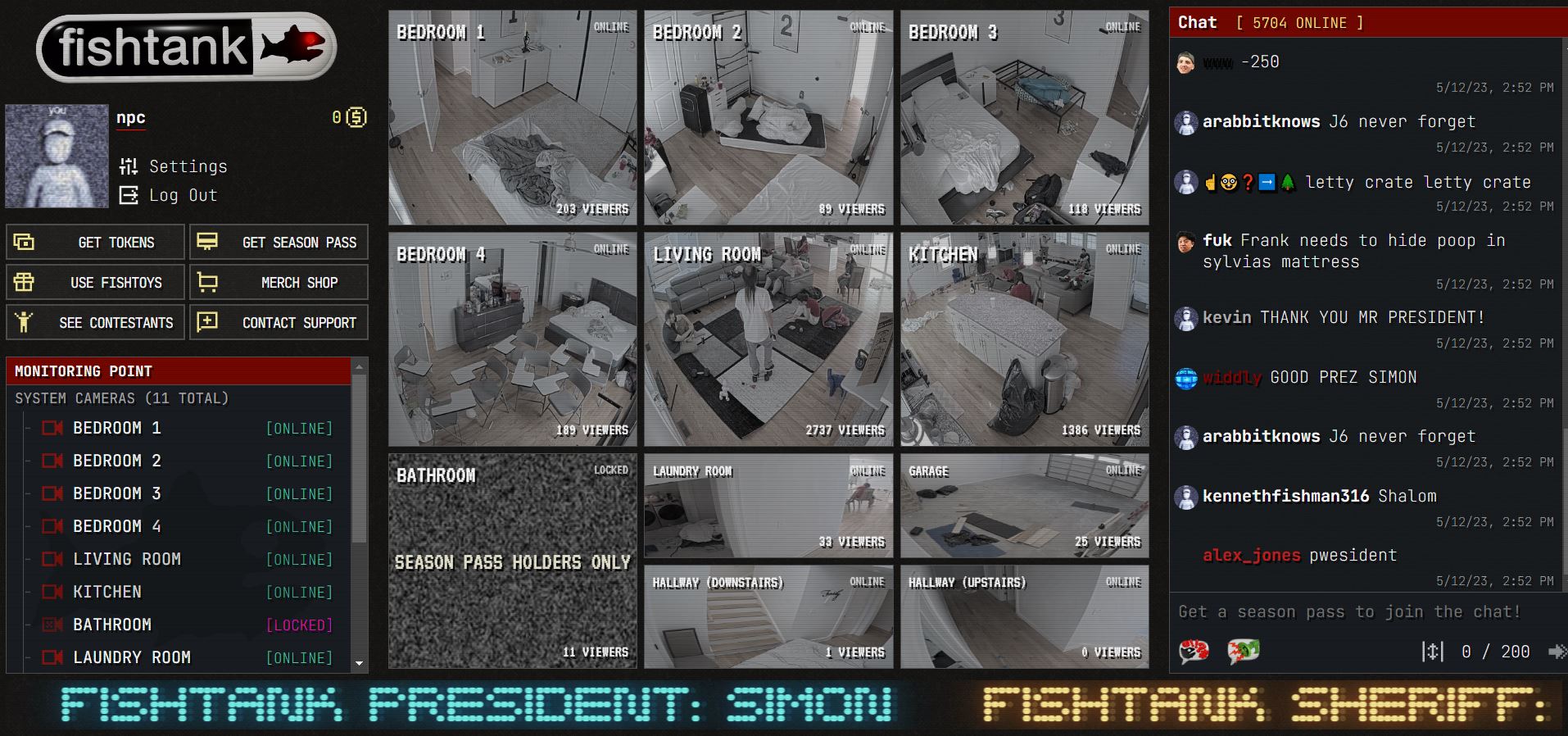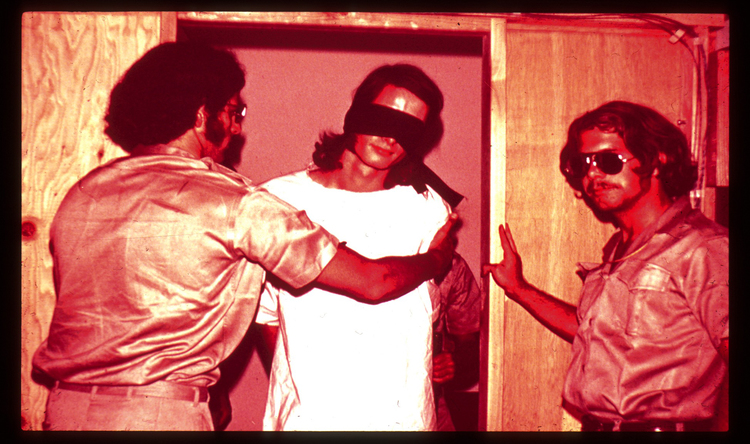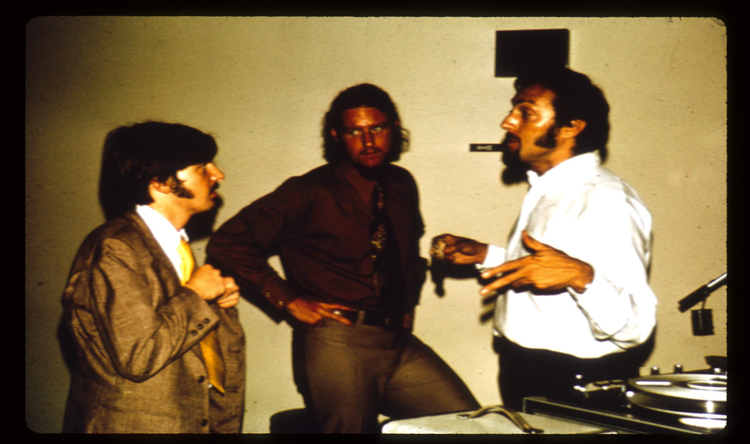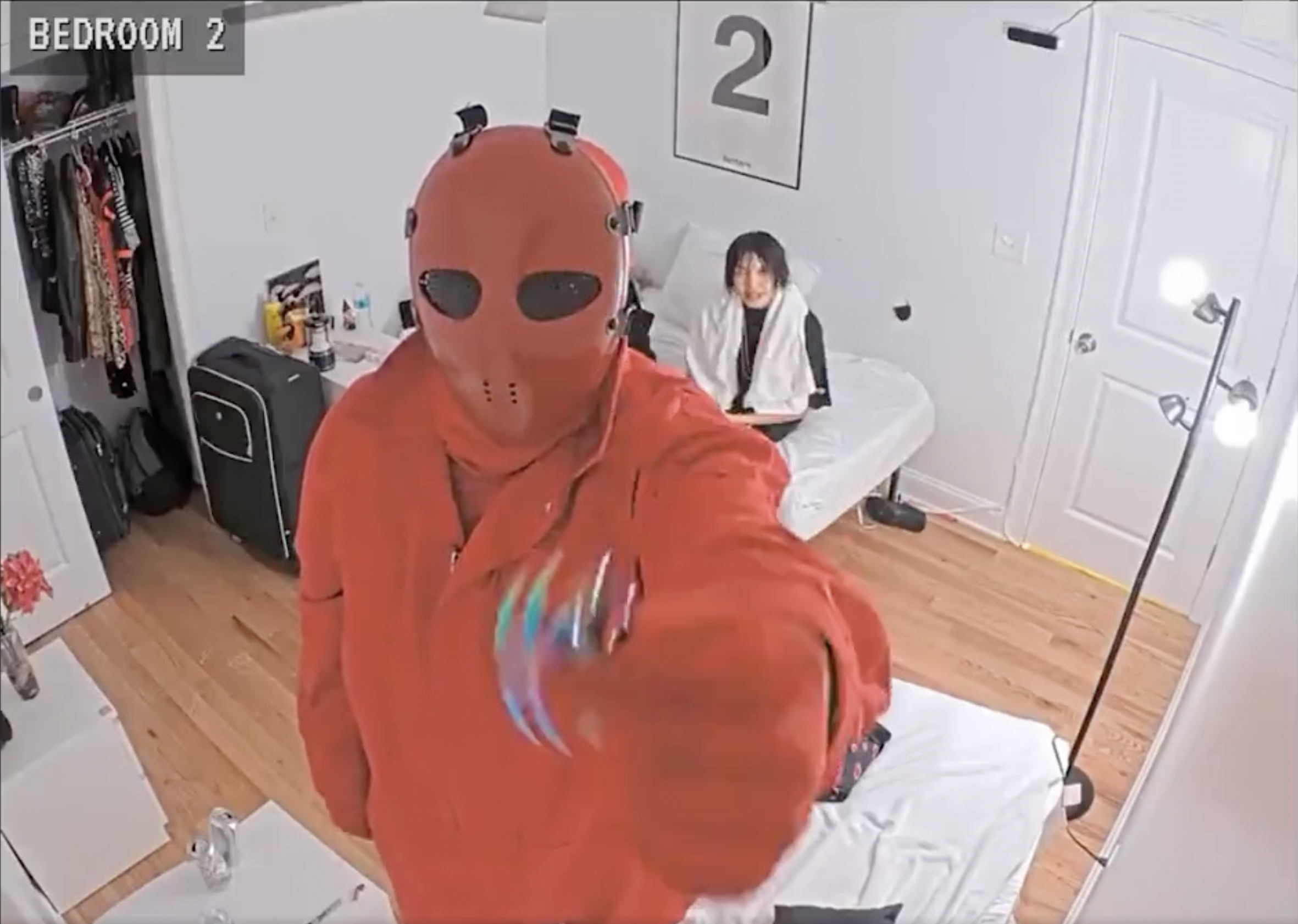It is day 25, approaching 9 am, and Airsoft Fatty is asleep half-naked on an L-shaped sofa. He is snoring – and some of the thousands of live viewers watching him find it annoying. They begin to leave comments, ‘Can they screen for sleep apnoea in season 2?’ one asks. Others are not so kind. This is Fishtank Live, an interactive gameshow which has taken the internet by storm.
Four weeks ago, eight contestants entered a ‘fully monitored Smarthouse’ where they are watched – and controlled – by a global audience. Contestants, or ‘fish’, are cut off from the outside world for six weeks as they compete to win a cash prize. Standing between them and victory is all the abuse the show’s producers and viewers can muster.

Fishtank Live homepage showing the interface
The show promises to make you, the viewer, its director. The Fishtank homepage features 11 live feeds, each broadcasting a 24/7 stream of a room in the house. Users can freely watch every camera except the bathroom, which is locked behind a paywall. The user interface apes a full-motion video game from the 1990s. The fish’s profiles are arranged in a ‘choose your fighter’ style, and stats pop up onscreen.
Fishtank Live wants to make you feel like a player in this game, not just a passive observer. By trading real currency for tokens, players can purchase ‘fish toys’. For around $300, players can order the producers to empty the kitchen’s rubbish bin onto the floor. At the $600 price point, a fish’s bed can be seized, or the fridge’s contents swapped with the freezer’s. A more benevolent player can order a loot crate for the fish they choose or deliver them a snack.
READ MORE: The Absolute State of Andrew Tate’s War Room
Tokens can also be used to play text-to-speech messages into the house. The messages are typically abusive. Or they can influence polls when players are invited to select the winner of one of the show’s many challenges. In short, Fishtank is the love child of Big Brother and The Sims that could only be conceived in our hyperreality.

A producer empties rubbish onto the floor
The show draws thousands of eyeballs around the clock and amasses many more views on clips posted to YouTube and Twitter. One of the more popular ‘highlights’ saw the show’s host, ‘Johnathan Goldstriker’, dump eight bags of rice around the house before challenging the fish to produce an exact tally of the grains. On another occasion, Goldstriker, wearing yellow boxing gloves, set about punching the doors off of kitchen cupboards and smashing up the fridge.
In the summer of 1971, Professor Zimbardo of the University of Stanford conducted what is now known as the Stanford Prison Experiment. He set up a mock prison in a university building and advertised for students to participate in what was set to be an academic study. When the students arrived, they were assigned a role – officer or prisoner.

A volunteer being instructed during the Stanford Prison Experiment

Professor Zimbardo (right), the architect of the Stanford Prison Experiment

Experiment volunteers
Within days participants fully embraced their roles, with the guards meting out brutality to their fellow students and prisoners punishing one another for disobeying prison rules. Even the professor, who played the role of the warden, lost himself in the fantasy. On day six, a visiting psychologist observed the poor mental state of the participants and convinced Zimbardo to call an early halt to the experiment. The Stanford Prison Experiment has been branded as one of the most unethical ever conducted.
That the most popular moments of Fishtank have revolved around things being done to the fish reveals something about the show’s appeal, which goes beyond the pay-to-play humiliation. It makes us feel more human. By reducing the contestants to the role of an NPC in a video game, we can assume the mantle of the main character – the person with some agency. As in a video game, the fish follow a basic routine, sleeping, eating, and making small talk until a player or producer drives the plot forward.
READ MORE: The Compo Face | A look at the British stories that really matter
The fish appear to have fully embraced their roles as NPCs, content with, or even pleased by, the confines of their tank. They stand around gormlessly as Goldstriker throws trash around or when a producer drags their mattress from the house. Like the prisoners, they appear to enjoy the safety of their pen and the derogation of their responsibilities to their higher-ups. They are concerned with following the rules and staying in the house – when most people would imagine they would be running from it at the first opportunity.
But they don’t run. Within days they acclimatised to living in something approximating a prison, where authority figures can torment them at will. And yet they stand around, glassy-eyed, as their food is destroyed or when their possessions are strewn about. When a fish is evicted, the mood is tragic, where jubilation ought to be.
But the truth is that the players paying to abuse the fish are no more ‘real people’ than Zimbardo’s guards were real guards. On the contrary, they might actually be the real NPCs in this twisted game.
In 2012 Derren Brown broadcast his Remote-Control Experiment. In it, a live audience was given the power to make decisions over the life of an unsuspecting victim named Chris. The mark was moved from one location to another by his mates who were in on the show while being filmed by hidden cameras. At various junctures in Chris’ journey, players could vote on whether something good or bad should happen to him.
Throughout the course of Chris’ evening, the audience purportedly voted for a producer to smash up his bedroom with a bat, for Chris to be wrongly accused of shoplifting, and then for him to be kidnapped. When actors sprung out to ‘kidnap’ Chris, he fled before being hit by a car travelling at speed.
After some feigning of concern, Brown revealed the footage was pre-recorded but that the audience voting had been authentic. It was, he said, a demonstration of deindividuation which exposed the potential for cruelty of an anonymous mob. The audience, which had been hollering as Chris’ life was apparently ruined, looked ashamed. In the heat of the moment, the audience had felt excited, more human than ever. But they were, in the end, the real NPCs.
https://twitter.com/kidswholive1/status/1657929643737903105?s=20
If there is something to be learned from Fishtank Live, it is that we might not really be the main characters. The fish, if nothing else, have come to terms with living in a tank – the same cannot be said for the rest of us.
At 2 pm, over 5000 live viewers watch as Airsoft Fatty becomes vertical on the sofa. Messages begin to cascade down the chat. 17 days remain.





